- Home
- Anne Stuart
Against the Wind
Against the Wind Read online
AGAINST THE WIND
Anne Stuart
Copyright © Anne Kristine Stuart Ohlrogge, 1985
Contents
Copyright
CHAPTER ONE
CHAPTER TWO
CHAPTER THREE
CHAPTER FOUR
CHAPTER FIVE
CHAPTER SIX
CHAPTER SEVEN
CHAPTER EIGHT
CHAPTER NINE
CHAPTER TEN
CHAPTER ELEVEN
CHAPTER TWELVE
CHAPTER THIRTEEN
CHAPTER FOURTEEN
CHAPTER FIFTEEN
CHAPTER SIXTEEN
CHAPTER SEVENTEEN
CHAPTER EIGHTEEN
CHAPTER NINETEEN
CHAPTER TWENTY
CHAPTER TWENTY-ONE
CHAPTER ONE
Maddy Lambert had never been so miserably uncomfortable in her life. Sweat was pouring down her back, sticking to the split plastic of the seat of the old Toyota. The glare of the sun penetrated her dark sunglasses, giving her a pounding headache, her slow pace over the rutted road did little to discourage the flies and mosquitoes from attempting to hitchhike, and the mugginess of the humid air clung to her skin.
She would have thought the dense vegetation of the Central American jungle that surrounded the narrow track calling itself a government highway would have provided at least the comfort of shade. But the thick, lush greenery trapped the heat and kept it captive, sending it wafting forth on each soft breeze, so that Maddy was longing for the dubious improvement of a suffocating stillness. Even at twenty miles an hour the pathetic rental car couldn’t avoid the blast of thermal air coming in the windows, air that would have turned grapes to raisins in a matter of minutes. Maddy had the fanciful notion that when she finally arrived in Puente del Norte she would be old and dry and wrinkled. But what the heat took away, the humidity would return. She’d be just as likely to be bloated with excess water.
And speaking of excess water, she thought with a groan as the nonexistent shock absorbers jolted her over another one of the interminable bumps on the once-paved road. She was going to have to pull off to the side of the track again, damn it all. Before setting out on this fool’s errand she’d been warned to keep drinking. The tiny country of San Pablo was coming out of the rainy season into the baking heat of summer, and dehydration was only one of the dangers. Maddy had stocked up on bottled water in the war-torn capital of La Mensa, had dutifully kept swigging the lukewarm Perrier that had cost her as much as a good California Champagne, and then had dutifully stopped every slow forty miles.
How anyone could get dehydrated in such humidity was beyond her comprehension, but she didn’t want to risk it. She’d have enough to contend with when she finally made it to Puente del Norte—she’d need to be at peak efficiency. Not that anyone could be efficient in such enervating heat, she thought. Even the summers in Southern California hadn’t accustomed her to the rigors of a San Pablan spring.
She had to admit it was a beautiful country, those parts that weren’t pitted by mortar shells, ravaged by poverty, and stripped by plundering soldiers of both the government and the resistance. For the millionth time Maddy thanked God that her father had chosen to hole up in the northern, more mountainous part of the country, where there supposedly was no fighting. There would have been no way she would have gotten to him if he’d been in the midst of the constant, hopeless battles waged between the Patronistas and the gray-shirted soldiers of President Morosa. Battles that had been waging for years now, with the enthusiastic aid of the U.S. government. And all this time her father had been in the middle.
But not for much longer. If she had to beat him over the head and drag him back, if she had to drug him and tie him up and bundle him into the back of the ramshackle Toyota, if she had to pull a gun on him (though heaven knows where she’d come across such a thing) and force him, he was coming with her. And no one was going to stop her, not after she’d come so far.
Damn it, it couldn’t be much farther. The valiant little car had been climbing steadily the last two days, up north from the capital of La Mensa into the mountains where the air was thinner, if not any cooler. She was already a day later than she’d expected, and the odometer, the only instrument working on the shattered glass dashboard, suggested that she had traveled far enough to make it halfway into Mexico instead of merely the northern reaches of San Pablo. Sooner or later, sometime that afternoon, she’d make it. The next scraggly little mountain town, or the one after that, would be Puente del Norte. And there she’d find her father. And there she’d find John Thomas Murphy.
She ran a slender, long-fingered hand through her cropped brown hair, lifting it off her narrow neck. Fourteen years, she thought. Fourteen years since her father had taken off with all his high ideals intact, leaving his family behind as he sought his destiny as a saint, and Jake Murphy had gone as his willing disciple. Fourteen years without a word, only the news reports filtering back. She’d seen her father on television occasionally in the years since. For the first few years she’d turned him off, unable to look at that lean, ascetic face, that holy gleam in the pale blue eyes so unlike her own, that devotion to causes and humanity that hadn’t filtered down to devotion to his own daughter.
But eventually the anger and the pain had lessened, faded into a vaguely curious apathy, so that she had taken to watching her father age before her eyes and the television camera. El Patrón, the Saint of San Pablo, he was called by the media, dispensing medical aid and education and food and his holier-than-thou support to the starving people of that oppressed country. Tolerated by the rigidly right-wing government as a harmless eccentric, worshipped by the Patronistas, the rag-tag rebel army who’d claimed him as their own, Samuel Eddison Lambert was in his element. And Maddy had watched him with mingled longing and wry acceptance. Until last week.
“He’s dying, you know,” her mother had said abruptly.
Maddy had finally returned her mother’s constant phone calls, mentally thanking God again that she lived in Southern California and her overwhelming mother was three thousand miles to the east, in the heart of upper-class Virginia.
“Who?” Maddy replied, ignoring the sudden clutching that told her she knew perfectly well who.
“Your father, of course,” Helen Currier Lambert Henderson snapped back in her brittle, perfectly modulated voice, and Maddy could see her as clearly as if all those miles didn’t separate them. The narrow, delicately painted lips, the brown eyes that somehow managed to look ice cold, the perfect white skin, magnificent cheekbones, and sweep of excellently tinted dark brown hair. Her long nails would be tapping the base of the telephone as she talked to her unsatisfactory daughter, and her calm, cool face would have an expression of fastidious irritation. “Who else would I be talking about?” she continued after she had waited long enough to have her displeasure known.
Maddy shrugged on the other end, a useless, unseen gesture, trying to give herself time to answer. “I don’t know. Maybe Uncle Max?”
“Your stepfather is in the best of health, thank you,” Helen snapped. “He takes care of himself.”
“I know he does,” Maddy said with just a tiny trace of malice. Maxfield Henderson’s devotion to his fifty-seven-year-old body was just short of obsession, an obsession Helen shared. “What do you mean, my father’s dying?” she hurried on before Helen could respond. “I saw him on Dan Rather just last week and he looked fine.”
“Don’t be naive, Maddy! That was file footage. Any fool could tell that was filmed during the summer months—everything was all dried out. San Pablo is just coming out of the rainy season—you won’t find a patch of brown anywhere right now.”
“How did you become such an expert on Central Am
erica, Mother? I thought you hated it down there.”
“Of course I hate it. There was no way I was going to follow your father into his self-imposed exile—”
“Even though you deserved it more than he did,” Maddy interrupted.
There was a long silence on the other end of the line, with only the long-distance crackle between them, and for a moment Maddy wondered if she’d gone too far. If her father really was ill, her mother wouldn’t be beyond using it to make her recalcitrant daughter obedient. She could hang up and refuse to tell her any more until Maddy groveled, and in this case she might have no choice.
“Mother?” she said.
The silence continued. “I should hang up on you,” her mother’s voice came back finally.
Maddy tapped her own pale, unpainted fingernails against the scarred oak desk that was littered with papers, swallowing her own anger and irritation. “What’s wrong with my father?”
“Cancer. And don’t ask me how I found out what Dan Rather doesn’t even know—Max has impeccable sources. Your father’s been sick for quite some time now, and of course he’s refused to leave San Pablo.”
“Why are you telling me all this? Do you want me to send him a get-well card?” Maddy drawled. “I don’t think he’d answer it. He never answered any of the letters I wrote him since he left us—I doubt that cancer’s going to change matters.”
“You’re a cold child, aren’t you?” Helen snapped.
“Like mother, like daughter,” she said softly.
Once again silence reigned, and Maddy looked at her paperwork with exasperation. Her mother’s phone calls were always a frustrating waste of time, and this one looked to be an award winner. “Look, Mother, I’m busy. What do you expect me to do about him? You’ve got a hell of a lot more connections than I do. Why don’t you send a doctor down to him if you’ve got a belated case of the guilties?”
“I have nothing to feel guilty about. I thought you might be interested to hear that your father’s dying.”
“Says who? I’ve never found your information to be a model of accuracy before. I suppose they found some tiny benign tumor and you decided this would be a good way to get Maddy to dance to your tune,” she said with a weary sigh. “Well, spit it out, Mother. What do you want from me? You’ve told me Samuel’s dying, now tell me what you want me to do about it.”
“Go down to San Pablo and bring him back.”
The Toyota bounced over another crater in the roadway, pulling Maddy out of her uncomfortable memories. The jungle was less dense now. Maddy had learned enough of the San Pablan geography in the last few days to know that she was within a mile or two of another town. Maybe Puente del Norte. In a matter of perhaps minutes she’d be seeing her father for the first time in fourteen years. And the irritation that had been pushing her the thousand miles or so into the war-torn jungles of San Pablo faded into sudden nervous concern.
Not that there’d be anything wrong with him, she assured herself, avoiding the potholes in the Grand Pablan Highway that more closely resembled swimming pools. Her mother had taken some minor indisposition and blown it out of proportion, using it to bring Maddy to heel once more. It wasn’t often she could manipulate the thirty-year-old daughter who’d moved out of her sphere of influence more than ten years ago. Maddy still didn’t know what Helen had to gain from sending her off on what would doubtless turn out to be a wild goose chase. But after countless long-distance arguments she had finally agreed to do what she’d intended to do all along. She decided to go after her father.
For once she could be thankful that Helen Currier Lambert Henderson, daughter of a political kingmaker who would have put Tammany Hall to shame, had married someone up to her weight. Visas to San Pablo were hard to come by. Max had gotten Maddy’s in a matter of hours, greasing the political wheels with his usual expertise that had always left Maddy amused and uneasy. When it came right down to it, she got along with her stepfather better than with her rigidly self-contained mother. At least Max Henderson had a sense of humor. Not much of one, admittedly, but more than Helen possessed.
The Greater Hollywood Help Network had seen their grants administrator leave with something akin to panic. It took all of Maddy’s considerable administrative skills to keep the small social service agency going, and all her creativity and perseverance to keep the grant money flowing in and right back out again. The money would continue moving while she was gone, but only in one direction—into the hungry bellies of the street people of Hollywood, the Armenian immigrants, and the hordes of San Pablan refugees who made their way into the country under cover of the night. And if Maddy didn’t retrieve her father, bring him back to the country he’d abandoned years ago and return to the interminable grants writing, those hungry bellies would get even hungrier.
A week, she’d figured she’d be gone, ten days tops. She had clear directions on how to get to the mountain stronghold of the Saint of San Pablo, and even with her knowledge of Spanish limited to a couple of years at boarding school and a slick tourist phrase book, she had little doubt as to her ability to get the job done. She’d always had great pride in her own efficiency.
But that efficiency hadn’t come face to face with a revolution until today. The almost empty plane she’d taken had been twelve hours late arriving in the capital city of La Mensa. It had detoured first to Honduras, then back to Mexico City, and then had finally been allowed to land in San Pablo after they’d cleared the debris of a bombed-out helicopter from the pitted runway. That hair-raising landing, bouncing and jouncing past the twisted wreckage of untold flying machines, had started the demoralization of Maddy Lambert. The government committee that greeted her helped it on its way.
“We are very concerned for your father, Miss Lambert,” General Ortega had assured her. He was very smooth, the general, and very very handsome, with that Latin condescension that was almost reassuring. He was telling her with those dark eyes of his that she was not to worry, he would take care of her, as his small, strong hand held her slim, tanned one. And Maddy had smiled blandly, every nerve alert. General Anastasio Ortega was Minister of Agriculture. Why an agriculture minister would need to be a general in the Gray Shirts was one question, why an agriculture minister would be concerned with the Saint of San Pablo’s daughter was another. Maddy had little doubt he was chosen for his looks and his charm with the ladies, and she was unimpressed.
“We are a very tolerant government, Miss Lambert,” he’d continued smoothly. “As is evident in our allowing your father to continue to enjoy his life in San Pablo, despite his very vocal complaints about our democracy. For many years now we have worried about his involvement with the murdering Patronistas, and we would be much relieved if you did prevail upon him to return to his own country.”
Maddy murmured something noncommittal in response, and the good general continued with his speech, his liquid eyes caressing her tall, narrow body that was on a level with his, his tanned hand with the wide gold wedding band toying idly with the gun that went so well with his gray uniform.
“Any way we may assist you, you have only to let us know. My government will of course provide a limousine and driver and an armed guard. For tonight, however, the president himself graciously requests the pleasure of your company at a state dinner. And tomorrow I have been given the honor of conducting you on a tour of our improvements in La Mensa, so that when you return to the United States you may assure your government that our commitment to progress and human rights is unassailable.”
Maddy smiled sweetly. “Thank President Morosa for me, General, but tell him I must regretfully decline.”
“But—”
“And thank him for the offer of the car and the escort,” she sailed onward, “but I have made other arrangements. Much as I long to see the improvements in La Mensa, I’m afraid that I cannot afford to wait. I’m already twelve hours behind schedule, and I planned to leave for Puente del Norte by noon today.”
“Miss Lambert, I cannot allow�
�”
“Allow, General?” She looked at him with an innocent question in her large brown eyes. “I thought my government had made all the arrangements. I have permission to travel on my own to the northern part of the country, to retrieve my father and bring him back to the United States. Is there some way that interferes with the agricultural concerns of San Pablo?”
General Ortega opened his mouth, shut it again, and Maddy could hear the gentle grinding of teeth. “Of course not, Miss Lambert. We only wished to make things easier for you. The Grand Pablan Highway is not at all what you’re used to, and while we have made great strides in law and order, the rebels have been draining our manpower in the north. I cannot guarantee your safety if you insist on going by yourself.”
Maddy smiled. “I don’t expect you to guarantee my safety, General. I consider that to be my responsibility.”
“You are very headstrong, Miss Lambert. I only hope you will not regret your decision. At least wait until tomorrow to leave, and think about our very generous offer.”
“I’m sorry, General. I’m leaving as soon as I can.”
It hadn’t been noon, it had been closer to three o’clock, and she hadn’t made it more than fifty miles when darkness had begun closing around her. For a moment she’d regretted her impulsive action. She’d lied to the so-helpful General Ortega—no arrangements had been made for a vehicle or supplies. Her directions to the tiny mountain town of Puente del Norte were the only thing she relied on. But she had the very strong suspicion that if she showed up at a rebel stronghold in a government limousine with an armed guard she wouldn’t be welcomed with open arms. Her father had been more than vocal about his disapproval of el presidente’s repressive regime, he’d been strident. Maddy didn’t owe him much, but he didn’t deserve to have his daughter show up surrounded by his sworn enemies.
Hertz, Avis, and their ilk had long ago abandoned San Pablo. The rusty, venerable Toyota she’d finally located had recently transported chickens and perhaps goats, and the odor, combined with the humid heat, almost sent her back to General Ortega. It would have been simple enough to find him—one of his Gray Shirts had been doing a not very effective job of following her since she’d managed to shake Ortega at the airport.

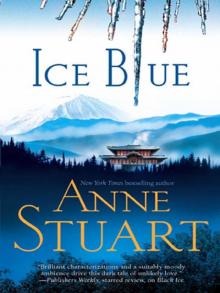 Ice Blue
Ice Blue Seen and Not Heard
Seen and Not Heard Never Marry a Viscount
Never Marry a Viscount Heartless
Heartless The Devil's Waltz
The Devil's Waltz Hidden Honor
Hidden Honor Silver Falls
Silver Falls Fire and Ice
Fire and Ice Nightfall
Nightfall Never Trust a Pirate
Never Trust a Pirate The Soldier and the Baby
The Soldier and the Baby Still Lake
Still Lake Reckless
Reckless The Spinster and the Rake
The Spinster and the Rake Winter's Edge
Winter's Edge At the Edge of the Sun
At the Edge of the Sun Into the Fire
Into the Fire Night of the Phantom
Night of the Phantom Ritual Sins
Ritual Sins Darkness Before the Dawn
Darkness Before the Dawn Against the Wind
Against the Wind Ruthless
Ruthless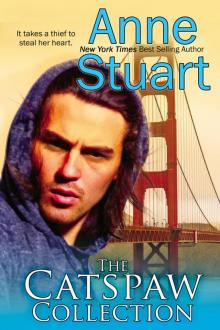 The Catspaw Collection
The Catspaw Collection Escape Out of Darkness
Escape Out of Darkness The Widow
The Widow Shameless
Shameless Black Ice
Black Ice Breathless
Breathless Shadows at Sunset
Shadows at Sunset Falling Angel
Falling Angel Housebound
Housebound Cold as Ice
Cold as Ice The Wicked House of Rohan
The Wicked House of Rohan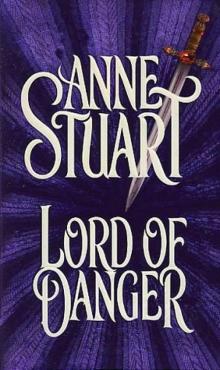 Lord of Danger
Lord of Danger The High Sheriff of Huntingdon
The High Sheriff of Huntingdon Wildfire
Wildfire Moonrise
Moonrise The Demon Count's Daughter
The Demon Count's Daughter Date With a Devil
Date With a Devil To Love a Dark Lord
To Love a Dark Lord Driven by Fire
Driven by Fire Special Gifts
Special Gifts Ice Storm
Ice Storm Shadow Lover
Shadow Lover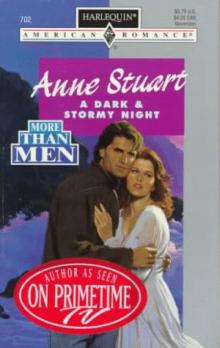 A Dark & Stormy Night
A Dark & Stormy Night Now You See Him...
Now You See Him... Lady Fortune
Lady Fortune Glass Houses
Glass Houses A Rose at Midnight
A Rose at Midnight Prince of Swords
Prince of Swords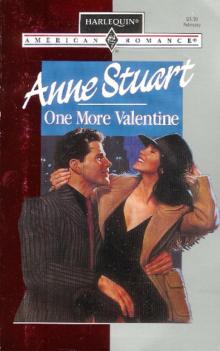 One More Valentine
One More Valentine Return to Christmas
Return to Christmas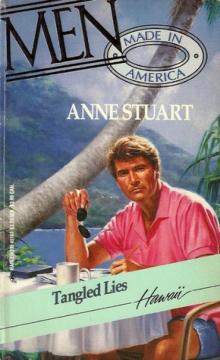 Tangled Lies
Tangled Lies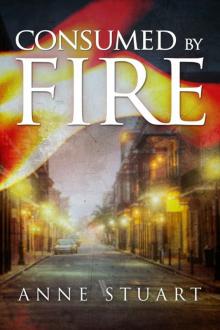 Consumed by Fire
Consumed by Fire The Fall of Maggie Brown
The Fall of Maggie Brown Wild Thing
Wild Thing Crazy Like a Fox
Crazy Like a Fox The Demon Count
The Demon Count Prince of Magic
Prince of Magic Wildfire (The Fire Series Book 3)
Wildfire (The Fire Series Book 3)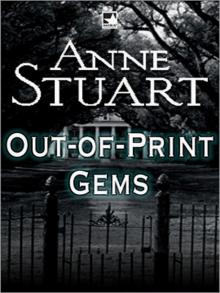 Anne Stuart's Out-of-Print Gems
Anne Stuart's Out-of-Print Gems Shadow Dance
Shadow Dance Under an Enchantment: A Novella
Under an Enchantment: A Novella Demonwood
Demonwood Blue Sage (Anne Stuart's Greatest Hits Book 3)
Blue Sage (Anne Stuart's Greatest Hits Book 3) Barrett's Hill
Barrett's Hill Angel's Wings (Anne Stuart's Bad Boys Book 5)
Angel's Wings (Anne Stuart's Bad Boys Book 5) Darkness Before Dawn
Darkness Before Dawn The Right Man
The Right Man The Houseparty
The Houseparty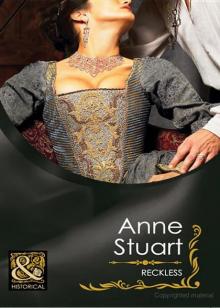 Reckless_Mills & Boon Historical
Reckless_Mills & Boon Historical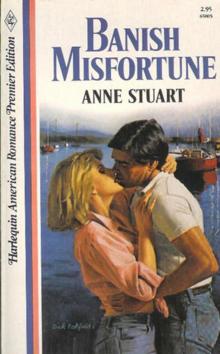 Banish Misfortune
Banish Misfortune Angel's Wings
Angel's Wings Chain of Love
Chain of Love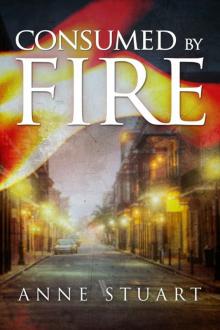 Consumed by Fire (The Fire Series)
Consumed by Fire (The Fire Series)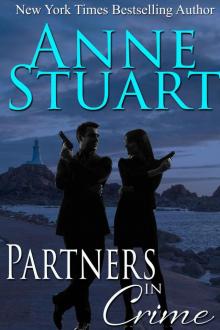 Partners in Crime (Anne Stuart's Bad Boys Book 4)
Partners in Crime (Anne Stuart's Bad Boys Book 4) The Soldier, The Nun and The Baby (Anne Stuart's Greatest Hits Book 2)
The Soldier, The Nun and The Baby (Anne Stuart's Greatest Hits Book 2)